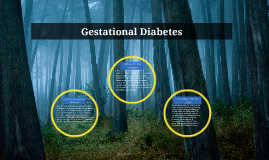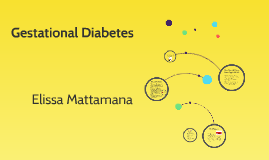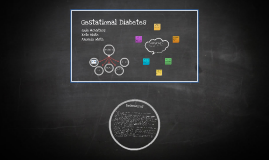Gestational Diabetes
Transcript: Gestational diabetes is a type of glucose intolerance where the first symptoms first present themselves in pregnancy. (Whitelaw & Gayle, 2011) Gestational Diabetes Increase insulin resistance. Hyperglycemia Placenta produces cytokines which increase the risk of gestational diabetes. Glucose in the blood can circulate to the baby Baby may not produce enough insulin to combat the excessive glucose produced by mother. Having gestational diabetes may increase the size of the baby which in turn increases the chances of the child developing obesity and type 2 diabetes. Hypoglycemia Macrosomia -> premature birth -> respiratory distress. If mother develops ketones it can cross the placenta and be harmful to the baby. Babies glucose level may be affected by the mothers glucose level during breastfeeding. Pathophysiology Insulin Injections References (2012, 21). Gestational Diabetes. Diabetes Australia - Diabetes Australia. Retrieved September 09, 2013, from http://www.diabetesaustralia.com.au (2012, 21). Gestational Diabetes. Better Health Chanel.Retrieved September 09, 2013, from http://www.betterhealthchannel.vig.gov.au American Diabetes Association. (2005). Gestational Diabetes: What to inspect. (5th ed.). American Diabetes Association Inc. USA. Barbour, L., McCurdy, C., Hernandez, T., Kirwan, J., Catalano, P., & Freidman, J. (2007). Cellular Mechanisms for Insulin Resistance in Normal Pregnancy and Gestational Diabetes.Diabetes Care, 30(2). Retrieved , from http://care.diabetesjournals.org doi:10.2337/dc07-s202 Chasan-Taber, L. 2012. Gestational Diabetes: Is It Preventable?. American Journal of Lifestyle Medicine. DOI: 10.1177/1559827611434401. Dunning, T. & Ward, G. (Eds). (2008). Managing Clinical Problems in Diabetes. Oxford: UK. Blackwell Publishing. Harlev, A., & Wiznitzer, A. (2010). New Insights on Glucose Pathophysiology in Gestational Diabetes and Insulin Resistance. Current Diabetes Reports, 10(3), 242-247. Retrieved , from http://link.springer.com doi:10.1007/s11892-010-0113-7 Moore, T. R. 2013. Diabetes Mellitus and Pregnancy. Medscape. Mocarski. M. & Savitz. D. A. 2012. Ethnic Differences in the Association Between Gestational Diabetes and Pregnancy Outcome. Matern Child Health 16:364–373. DOI 10.1007/s10995-011-0760-6 Rae, A., Sivakumar, P., Burbridge, H., Cheong-Duryea, A., & Chauhan, P. (2013). Healthy Eating for Gestational Diabetes. Government of Western Australia: Deparment of Health. Retrieved from http://kemh.health.wa.gov.au/brochures/consumers/wnhs0560.pdf Roy, M., Tomar, M., & Jindal, R. (2012). Recent advances in the treatment of gestational diabetes. Apollo Medicine, 9(3), 242-245. Retrieved , from http://www.apollomedicaljournal.net doi:10.1016/j.apme.2012.07.007 Touchette, N. (2005). American Diabetes Association complete guide to diabetes. (4th ed.). American Diabetes Association Inc. USA. Whitelaw, B. & Gayle, C. 2011. Gestational Diabetes. Obstetrics, Gynaecology & Reproductive Medicine. Volume 21, Issue 2, Pages 41–46. http://dx.doi.org/10.1016/j.ogrm.2010.11.001 Mother After Birth Patient Education Treatment Risk Factors Between 1998 and 2013 there were 24, 392 cases of gestational diabetes Average age of patient with gestational diabetes was 33 years old It affects 3-8% of all pregnancies Accounts for 90% of all diabetes in pregnancy (Moore, 2013) Almost half of these women who suffer from gestational diabetes will develop type 2 diabetes after giving birth Gestational Diabetes Light Physical Activity Obesity Multiple pregnancies Previous history of GDM Family history of diabetes Ethnicity Maternal age Previous Macrosomic Pregnancy Polycystic Ovary Syndrome Twin Pregnancy Some women are asymptomatic. Some women suffer from excessive thirst, urination and fatigue. The screening test available is a non-fasting glucose test. If more than 7.2 mmol/l of glucose a secondary test is conducted called an oral glucose tolerance test. Signs and Symptoms Monitoring Blood Glucose Levels Drug Therapy Statistics Baby after birth Diet Management Jade McWaters Kate White Amanda White 40-60% chance of developing type 2 diabetes 5-15 years after giving birth. Mother may not be resistant to insulin anymore. Testing is recommended up to 2 weeks after delivery. Glucose tolerance test. Development of gestational diabetes in future pregnancies.

















